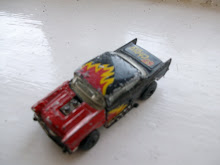Completing a trilogy of sorts (after getting through similar books on Rough Trade and Factory), I recently finished reading David Cavanagh's excellent biography of Creation Records, My Magpie Eyes Are Hungry For The Prize. Thankfully, the tale doesn't centre too much around a certain pub-rock band until strictly necessary and instead focuses around the man who founded and provided the public face, Alan McGee.
While Factory had the aesthetics and my all-time favourite band and Rough Trade had the (apparently) right-on politics, Creation had the roster. A large number of my favourite bands recorded for them: Jesus and Mary Chain, Felt, My Bloody Valentine, the House of Love, Ride, Slowdive and Teenage Fanclub.
McGee was unlike his fellow indie honchos Tony Wilson and Geoff Travis in several crucial respects. For one, he was solidly working class and hadn't gone to university. Secondly, he played in several bands prior to founding a label and even used that to release music by Biff Bang Pow!, playing alongside his business partner Dick Green. Thirdly, and perhaps most telling, unlike the other two he made a very large amount of money from the music industry.
Through the initial chapters, Cavanagh provides context for McGee's ambitions by offering backstory on the indie scene of the early 80s in both Glasgow (Postcard Records) and London (Rough Trade, Cherry Red). Coming from an angle of fanzines and organising club nights, the big break is when McGee sees the potential in a bunch of young lads from East Kilbride who make a racket based on lack of guitar skill and excessive feedback helped (apparently) by a crap PA. Releasing the Jesus and Mary Chain's debut single Upside Down puts Creation, and McGee, on the map as it sells tens of thousands.
Cavanagh gives plenty of time to the the period between the label's first success and last. Also-rans such as the Loft are given their time to tell their stories of how McGee stumbled along till 1990, when he snapped up Ride (giving him his first top 75 single and top 20 album) and Primal Scream stopped being a crap rock band and embraced the present. Of interest to me was the explanation of the House of Love's guitarist Terry Bickers' psychological problems that saw him kicked out of the band, at the same time scuppering the band's vast potential.
Matters begin to get a bit ugly in when McGee embraces the lifestyle associated around house music, gobbling ecstasy like sweets, later moving onto a copious cocaine habit that results in a complete breakdown by the mid 90s, of which the man himself talks of with brutal honesty. When Oasis do enter the picture, thanks to an (in)famous gig in Glasgow, McGee is already beginning the retreat from the day-to-day running of the label, which became much more business-like after Sony bought up 49% of the shares to save it from going bust.
It's here that the story, to me, wanes. Oasis sell shitloads of albums despite or because of a chronic lack of intelligence, McGee earns millions and gets involved in the New Labour bandwagon, despite having always been something of a budding capitalist whose main interest seemed to be becoming a millionaire. Strange at the time, less so in retrospect. Indeed, it may be said that the "prize" of the title was the vast wealth he came into. Meanwhile, his label struggles to sell albums by anyone not monobrowed and from Burnage. Only the Boo Radleys, with their #1 album Wake Up Boo! seem to be able to come close to competing, and even then only briefly.
By 1999, he clicks along with everyone else he's been duped by Blair, though not before apparently influencing policy on struggling musicians and unemployment benefits, and backs away from politics. He also folds Creation and starts again with Poptones, whose main plus point was bringing the Hives to wider attention.
My Magpie Eyes... is about as comprehensive a history of a label as you're going to get. Petty arguments are examined while all the major players from all parts of the business (bar members of Oasis and Primal Scream's successful line ups) are interviewed through the 700+ pages, making this worthy reading for anybody interested in the British indie scene of the 80s and 90s.
Subscribe to:
Post Comments (Atom)

No comments:
Post a Comment